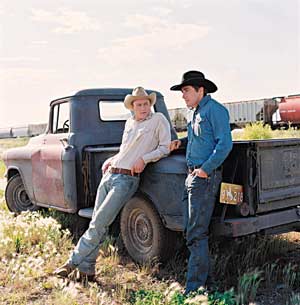| Tools: Save | Print | E-mail | Most Read |
| Genre Buster |
| Adjust font size: |
By every indication,
The movie, about a pair of ranch hands who, in the early 60s, stumble into a passionate affair and continue their forbidden romance for 20 years, is adapted from a short story by Pulitzer-winning Annie Proulx. With a young cast of promising talent, it has emerged from the closet as an unlikely landmark in cultural Ang Lee started his filmmaking career in the early 1990s with a trilogy of Chinese-language chamber dramas with the father-knows-best theme. Since then, he has been bouncing from genre to genre in a diversification scheme that has defied conventional wisdom. Lee explains that it does not come by design. For example, he did not set out to make a gay Western, but was, first of all, moved by the story and the emotional wallop it packed. What he saw was a subtext that's universal, that people from any background, regardless of sexual orientation, can relate to. Behind his genre-busting spree is a common thread that treats all human beings with sympathy and understanding. In Brokeback, the wives are not brushed aside as an inconvenience in plot device, as happens with many other on-screen love stories. As a matter of fact, the agony of the protagonist's wife is brought into sharp focus. Similarly, in Eat Drink Man Woman, audiences are not led to identify with only the father or the daughters, but understand the rationale behind each one of them and the dynamics of their relationship. Thus, the characters are not one-dimensional, but richly nuanced and full of humanity, which can strike a chord with people beyond their specific time or place. Ironically, this universality in perception does not come from delving into each character's world, but by taking a step back. Lee attributes it to his "outsider" status. As he was born and grew up in Such a constant sense of being a stranger in a strange land could crush someone with less capability for inner peace, but Ang Lee, while admitting to being repressed and withdrawn, turned the handicap into a vintage point for observation. "I did a women's movie, and I'm not a woman. I did a gay movie, and I'm not gay. I learned as I went along," he once said. And he always manages to find a "middle road" between getting under the skin of his characters and standing back to place them in perspective. Identity Ang Lee, as a Chinese American, straddles two cultures. But is he more Chinese or more American? Paradoxically, the same film gave Chinese audiences a hard time to categorize. While Lee had expected it to be a hit in Then Zhang Yimou's Hero came out, and critics in It was from this time on that people woke up to the possibility that Ang Lee, for all his exposure to the West, could be more traditionally Chinese than the film-makers residing in Confucian film-maker "Ang Lee is steeped in Confucianism," comments Huang Haikun, editor-in-chief of Shanghai-based Movie View magazine. "One might be tricked by his deftness with American or British subject matters. But there is no contradiction here. Because he is so at ease with his own cultural identity he is always able to find the larger picture of his characters, whatever their nationality, gender or sexuality, and touch their souls." Lee's "Chineseness" goes beyond employing a token Chinese actor or creating a plot line that involves his homeland. It is his way of thinking and seeing and even his way of being. When people in Like his personality, he is never loud in his movies, but low-key and elegiac. A few years ago, he told The New York Times that the film with the biggest influence on him was the 1963 musical Love Eterne (Liang Shanbo and Zhu Yingtai). He analyzed scene by scene how the lovers exchanged furtive glances and used water sleeve - the dainty Chinese opera movement - to express their pent-up longings. It is not surprising that this technique has seeped into Lee's non-Chinese-themed works. He is like the Chinese tai chi master - but unlike the father figure in his debut Pushing Hands - at times delicate and at times firm, always graceful and persuasive, but a bit too deliberate paced for those with short attention span. In the topsy-turvy world of contemporary cinema, Ang Lee is the ultimate master of words left unsaid and passions viewed in dispassionate light. He is the lord of Confucian moderation and serenity. ( |
| Tools: Save | Print | E-mail | Most Read |
 |
| Related Stories |
|
Product Directory China Search |
Country Search Hot Buys |
